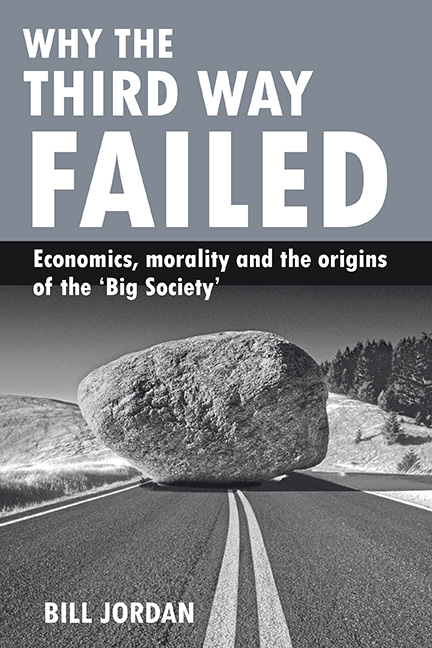five - Moral regulation: rituals, symbols and the collective conscience
Published online by Cambridge University Press: 01 September 2022
Summary
The moral failures of the Third Way stemmed from its mistaken conception of the process of moral regulation. As its leading exponents claimed, the end of the 20th century marked a period in which society was moving from traditional, collective standards of behaviour, uncritically adopted from family, neighbourhood and class, to individual, ‘reflexive’, self-responsibility, in which ‘we are what we make of ourselves’ and ‘the moral thread of self-actualisation is one of authenticity … based on “being true to oneself “’ (Giddens, 1991, pp 75-97).
In this view, the Third Way was addressing a new kind of society, and had to adapt to ‘the changing nature of the family, work and cultural identity’ (Giddens, 1998, p 46). As we saw in Chapter Two, its approach lay partly in the assertion of values such as equality of opportunity, which informed its policies on education and welfare-to-work activation. But it also demanded that individuals took responsibility for themselves, in terms of work, saving and updating their skills (DSS, 1998, p 80), and that they participated in civil society organisations (Blair, 1996). Individuals were seen as choosing the associations and activities which reflected their values and identities, in a complex and diverse community. Indeed ‘community’ was itself a Third Way value (Blair, 1998a), but this took a ‘post-traditional’ form, moving beyond class issues (Driver and Martell, 2001).
In this chapter I argue that the Third Way's adoption of selfactualisation and self-responsibility as its model of moral regulation meant that it greatly underestimated the importance of emotional, aesthetic, symbolic and ritual elements in the creation of the social order, and above all it discounted collective influences on social relations. By buying into the notion that ‘reflexive individualisation’ was a wholly new, post-traditional feature of late modern (or post-modern) culture, it mistook a culturally produced dominant myth for a new liberation, in which individuals met as ‘real’, ‘reflexive’ and ‘authentic’.
Mary Douglas anticipated this development. She argued that marketorientated social relations produced the illusion of rational choice and ‘the conviction that we have escaped from the old non-market institutional controls into a dangerous, new liberty’. Believing ourselves to be ‘uncontrolled by the idea of the sacred’, and that we have achieved ‘full self-consciousness’, we are in fact simply parroting a ‘collective representation’ of our society – indeed a form of ‘primitive solidarity’ (Douglas, 1987, p 99).
- Type
- Chapter
- Information
- Why the Third Way FailedEconomics, Morality and the Origins of the 'Big Society', pp. 109 - 128Publisher: Bristol University PressPrint publication year: 2010



